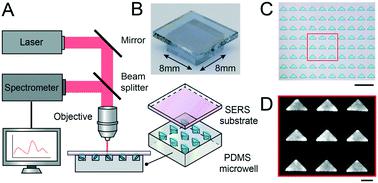Our official English website, www.x-mol.net, welcomes your feedback! (Note: you will need to create a separate account there.)
Bacteria encapsulation and rapid antibiotic susceptibility test using a microfluidic microwell device integrating surface-enhanced Raman scattering.
Lab on a Chip ( IF 6.1 ) Pub Date : 2020-06-06 , DOI: 10.1039/d0lc00425a Hsiu-Kang Huang,Ho-Wen Cheng,Cheng-Chieh Liao,Shang-Jyun Lin,Yi-Zih Chen,Juen-Kai Wang,Yuh-Lin Wang,Nien-Tsu Huang
Lab on a Chip ( IF 6.1 ) Pub Date : 2020-06-06 , DOI: 10.1039/d0lc00425a Hsiu-Kang Huang,Ho-Wen Cheng,Cheng-Chieh Liao,Shang-Jyun Lin,Yi-Zih Chen,Juen-Kai Wang,Yuh-Lin Wang,Nien-Tsu Huang

|
The antibiotic susceptibility test (AST) is a general laboratory procedure for bacterial identification and characterization and can be utilized to determine effective antimicrobials for individual patients. Due to the low bacterial concentration, conventional AST usually requires a prolonged bacterial culture time and a labor-intensive sample pretreatment process. Therefore, it cannot perform timely diagnosis or treatment, which results in a high mortality rate for seriously infected patients. To address this problem, we developed a microfluidic microwell device integrating surface-enhanced Raman scattering (SERS) technology, or the so called the Microwell-SERS system, to enable a rapid and high-throughput AST. Our results show that the Microwell-SERS system can successfully encapsulate bacteria in a miniaturized microwell with a greatly increased effective bacteria concentration, resulting in a shorter bacterial culture time. By attaching a microchannel onto the microwell, a smooth liquid and air exchange can purify the surrounding buffer and isolate bacteria in an individual microwell for independent SERS measurement. For proof-of-concept, we demonstrated a 2 h AST on susceptible and resistant E. coli and S. aureus with a concentration of 103 CFU mL−1 in the Microwell-SERS system, whereas the previous SERS-AST method required 108 CFU mL−1 bacterial suspension droplets dispensing on a SERS substrate. Based on the above features, we envision that the Microwell-SERS system could achieve highly sensitive, label-free, bacteria detection and rapid AST to enable timely and accurate bacterial infection disease diagnosis.
中文翻译:

使用整合了表面增强拉曼散射的微流控微孔设备进行细菌包封和快速抗生素敏感性测试。
抗生素敏感性试验(AST)是用于细菌鉴定和表征的一般实验室程序,可用于确定单个患者的有效抗菌素。由于细菌浓度低,常规AST通常需要延长细菌培养时间和费力的样品预处理过程。因此,它不能及时进行诊断或治疗,从而导致严重感染患者的高死亡率。为了解决这个问题,我们开发了一种集成了表面增强拉曼散射(SERS)技术或所谓的Microwell-SERS系统的微流控微孔设备,以实现快速,高通量的AST。我们的结果表明,Microwell-SERS系统可以将细菌成功封装在微型化的微孔中,有效细菌浓度大大提高,从而缩短了细菌培养时间。通过在微孔上连接微通道,平滑的液体和空气交换可以纯化周围的缓冲液,并在单个微孔中分离细菌,以进行独立的SERS测量。为了进行概念验证,我们证明了2小时的AST易感性和耐药性在Microwell-SERS系统中,大肠杆菌和金黄色葡萄球菌的浓度为10 3 CFU mL -1,而以前的SERS-AST方法需要在SERS基质上分配10 8 CFU mL -1细菌悬浮液滴。基于以上特征,我们设想Microwell-SERS系统可以实现高度灵敏,无标签的细菌检测和快速AST,从而能够及时,准确地诊断细菌感染疾病。
更新日期:2020-07-14
中文翻译:

使用整合了表面增强拉曼散射的微流控微孔设备进行细菌包封和快速抗生素敏感性测试。
抗生素敏感性试验(AST)是用于细菌鉴定和表征的一般实验室程序,可用于确定单个患者的有效抗菌素。由于细菌浓度低,常规AST通常需要延长细菌培养时间和费力的样品预处理过程。因此,它不能及时进行诊断或治疗,从而导致严重感染患者的高死亡率。为了解决这个问题,我们开发了一种集成了表面增强拉曼散射(SERS)技术或所谓的Microwell-SERS系统的微流控微孔设备,以实现快速,高通量的AST。我们的结果表明,Microwell-SERS系统可以将细菌成功封装在微型化的微孔中,有效细菌浓度大大提高,从而缩短了细菌培养时间。通过在微孔上连接微通道,平滑的液体和空气交换可以纯化周围的缓冲液,并在单个微孔中分离细菌,以进行独立的SERS测量。为了进行概念验证,我们证明了2小时的AST易感性和耐药性在Microwell-SERS系统中,大肠杆菌和金黄色葡萄球菌的浓度为10 3 CFU mL -1,而以前的SERS-AST方法需要在SERS基质上分配10 8 CFU mL -1细菌悬浮液滴。基于以上特征,我们设想Microwell-SERS系统可以实现高度灵敏,无标签的细菌检测和快速AST,从而能够及时,准确地诊断细菌感染疾病。


























 京公网安备 11010802027423号
京公网安备 11010802027423号